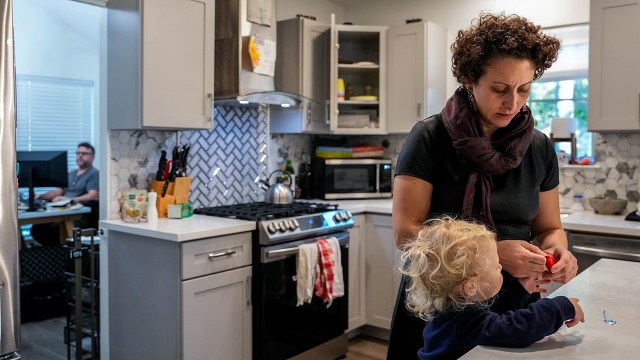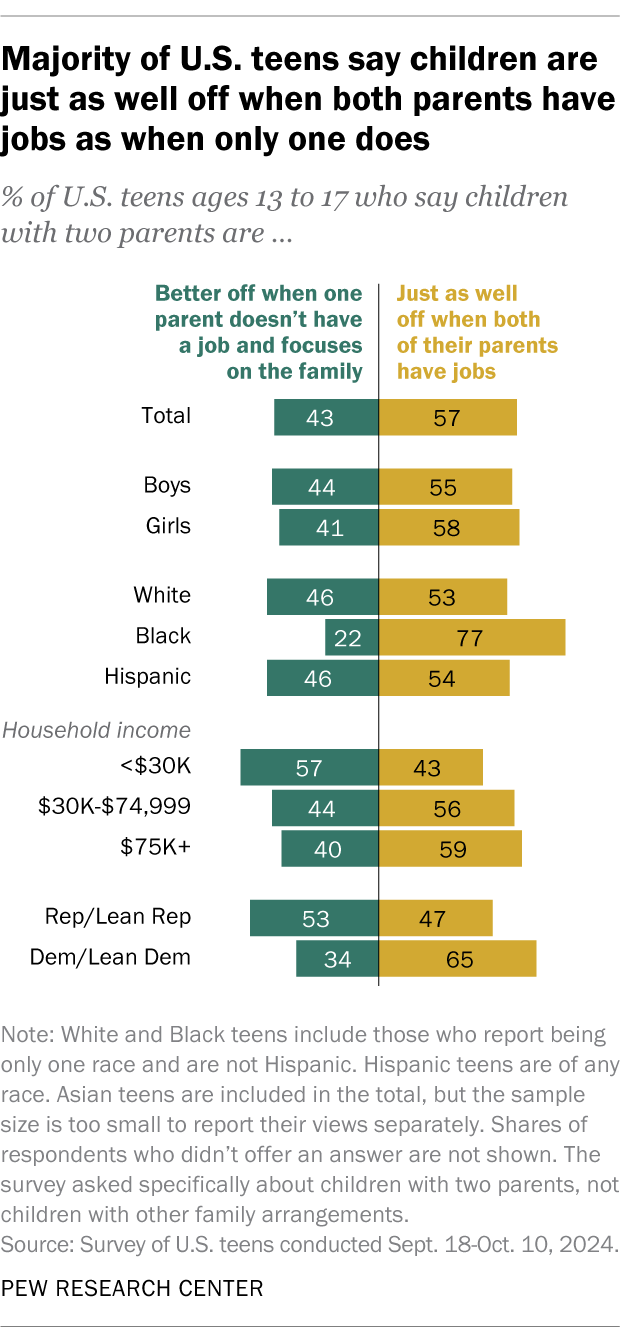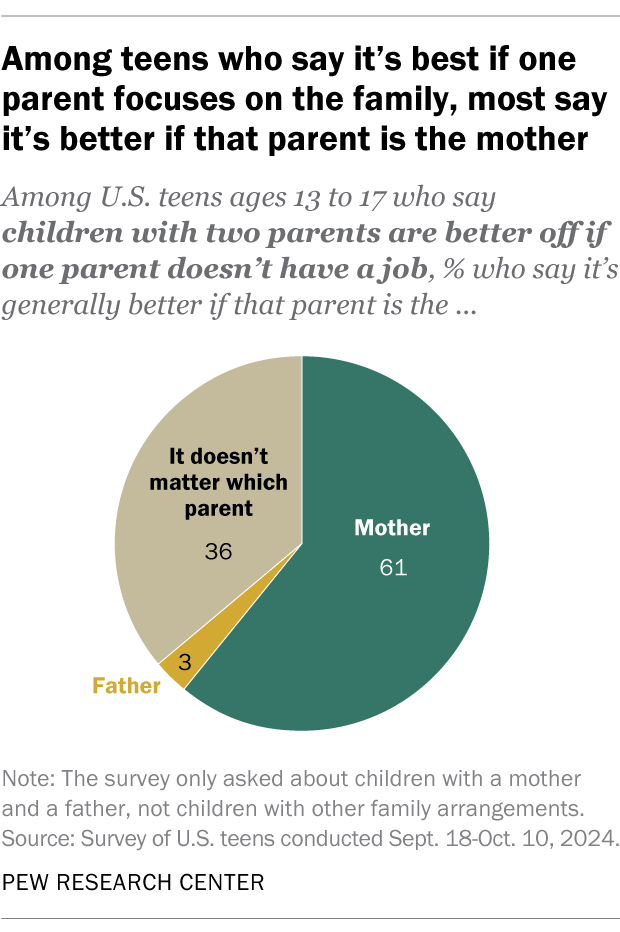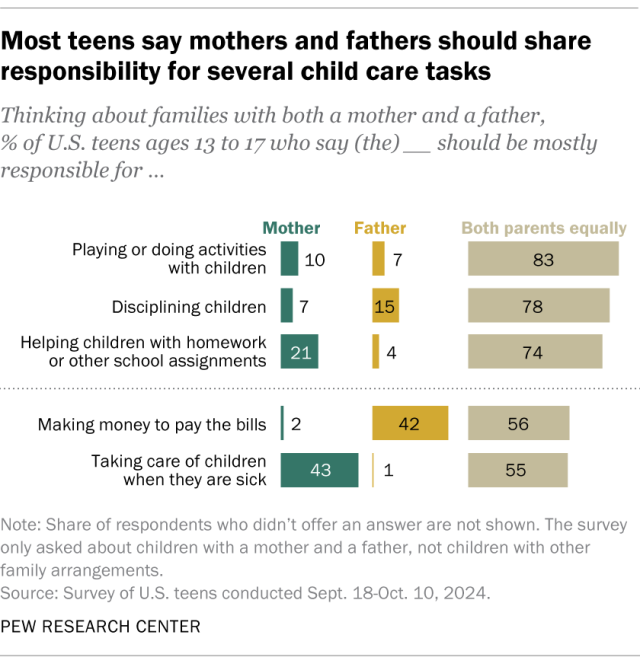
In the United States, 43% of teenagers say children are better off when one parent doesn’t have a job and focuses on the family. A larger share (57%) say children are just as well off when both of their parents have jobs, according to a recent Pew Research Center survey of teens ages 13 to 17.
The fall 2024 survey examined teens’ views on a broad range of topics, including their experiences at school, the pressures they face, their friendships and support networks, and their future plans and goals. On many of these topics, teen girls express different views from teen boys.

By contrast, teen girls and boys do not differ significantly on whether it’s better for one or both parents to have jobs. But teens’ attitudes on this question vary by other demographic factors.
For example, 57% of teenagers in households that make less than $30,000 per year say children are better off when one parent doesn’t have a job and focuses on the family. In contrast, 56% of teens in households making $30,000 to $74,999 and 59% in households making $75,000 or more say children are just as well off when both parents have jobs.
Teenagers who identify as Republican or lean toward the GOP are also more likely than those who identify as or lean Democratic to say children are better off if one parent doesn’t have a job and focuses on the family (53% vs. 34%). In turn, Democratic teens are more likely than Republican teens to say children are equally well off when both parents have jobs (65% vs. 47%).
There are differences by race and ethnicity, too:
- White and Hispanic teens (46% each) are more likely than Black teens (22%) to say children are better off if one parent focuses on the family. (The sample size for Asian teens is too small to analyze their views separately.)
- Black teens (77%) are more likely than Hispanic (54%) and White (53%) teens to say children are just as well off if both parents have jobs.
It’s important to note that the survey asked specifically about children with two parents. Many American children live in single-parent households.
Is it better if a mother or a father focuses on the family?

Among the subset of teens who say children are better off if one parent doesn’t have a job, 61% say it’s better for the mother to be the one who focuses on the family. Another 36% say it doesn’t matter which parent focuses on the family, while only 3% say it’s better for the father to do this. The survey asked specifically about children with a mother and a father to better understand teens’ views of gender roles.
In 2021, 26% of mothers and 7% of fathers were stay-at-home parents, according to a Center analysis of Census Bureau data.
Republican teens are more likely than Democratic teens to say the mother should be the one who focuses on the family (66% vs. 52%).
Again, there are no major differences by gender.
How should parents share responsibilities?

We also asked teens whether mothers or fathers should be mostly responsible for certain child care tasks. Large majorities of teens say both parents should be equally responsible for several tasks:
- Playing or doing activities with children (83%)
- Disciplining children (78%)
- Helping children with homework or other school assignments (74%)
There are only small gender differences in views of these tasks. For example, 82% of teen girls say both parents should be equally involved in disciplining children, compared with 75% of boys.
More than half of teens also say some other tasks should be divided equally between mothers and fathers. But sizable shares say one parent should be mostly responsible for:
- Making money to pay the bills: 42% of teens say fathers should be mostly responsible for this, while only 2% say mothers should. Still, 56% say both parents should.
- Taking care of children when they’re sick: 43% say mothers should mostly do this, while just 1% say fathers should. Even so, a 55% majority say both parents should.
For these tasks, there are some notable differences based on teens’ political identities. For example, Republican teens are more likely than Democratic teens to say fathers should be mostly responsible for making money (51% vs. 33%, respectively) and less likely to say both parents should be equally responsible (47% vs. 64%).
Teens do not differ by gender when it comes to which parent should be mostly responsible for making money. And they only differ slightly on which parent should take care of sick children, with teen girls more likely than teen boys to say both parents should do this (61% vs. 49%).
What do adults think?
The fall 2024 survey sought to understand how teens view parents’ roles in the household. But we also asked U.S. adults similar questions in a 2023-24 survey.
A majority of adults (55%) say children with two parents are better off when one parent focuses on the family – the opposite viewpoint that a majority of teens take. A smaller share of adults (43%) say children are just as well off when their parents work outside the home.
Among the subset of adults who say it’s better for children when one parent focuses on the family, 59% say it doesn’t matter which parent does this, and 40% say it’s best when the mother does this. This is again the reverse of what teens say, among those who say it’s better when one parent focuses on the family.
For more on what U.S. adults say about gender roles, read the related chapter of our report “How Americans See Men and Masculinity.”
Note: Here are the questions used for this analysis, along with responses, and the survey methodology.
